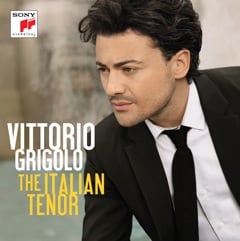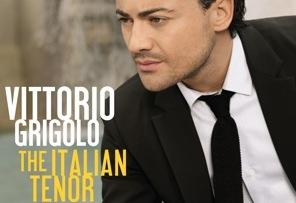
He has the voice of an angel, the one-day growth of a soap opera pin-up, and the butt of a porno star. He’s also got enough squillo (ring) to rival a carillon, and the artistic smarts to know when to sing softly, and when to let it all hang out.
He’s so good, so clearly superior to just about every other tenor singing Italian rep today, that he’s opening the Met’s season as Rodolfo in La bohème. And he’s so hot that Sony Classical thinks that by selling his debut CD at midprice, you won’t mind the absence of lyrics and translations. Nor, they hope, will you pay much attention to an occasional over-slathering of sentiment that carries over from the previous “Popera” (his term) crossover recordings for Universal that partnered him with the vacuous but sweet Hayley Westenra and air freshener queen Katherine Jenkins. May Sony, the crossover king, spare us the scourge of a reprise.
His name is Vittorio Grigolo. His voice is manly and exciting, yet retains a sweet, high, lighter lyric tenor quality as he approaches a blazing high C. He classifies his instrument as lirico pieno, which means “full lyric;” I classify it as give me more. It’s a voice all its own, used with consummate artistic skill and control. Anyone with blood in their veins will thrill at the sound.
Listen to the Music
Di Quella Pira (From Il Trovatore)
Raised in Rome in a family that played cassettes of the Three Tenors in their car, young Vittorio spent four years as a treble soloist in the Sistine Chapel choir. Toward the end of his tenure, shortly before his voice changed, he appeared alongside Luciano Pavarotti, singing the Shepherd in Tosca. Critics hailed him as “Pavarottino,” and the great one wrote in little Vittorio’s autograph book, “You’re going to be Number One … Vittorio Primo!”
Ten years later, as the youngest tenor ever to sing at La Scala, he commemorated the Verdi centenary by singing Beethoven’s Ninth under Riccardo Muti. Unconsciously emulating George W., he carried the wrong score onstage. At least he didn’t pretend to read from it while holding it upside down.
Today, at age 33, he focuses mainly on Italian and French lyric tenor rep. On this CD, you won’t hear any of the Manon he’ll sing at Covent Garden, or the Berlioz, Gounod, and Offenbach he’s undoubtedly saved for his next recital. Instead, he’s mixed the familiar — “E lucevan le stele” from Tosca, “Donna non vidi mai” from Manon Lescaut, “Che gelida manina” from La bohème, “Una furtive lagrima” from L’elisir d'amore, “Spirto gentil” from La favorita, two arias from Rigoletto, and a ringing “Di quella pira” from Il trovatore that tackles the high C head-on, with possibly less familiar fare from Verdi’s Il corsaro. Luisa Miller, Un ballo in maschera, Gianni Schicchi, and Le villi. It’s all Donizetti, Puccini, and Verdi, and it’s all delicious.
Quibbles? Despite the occasional tendency to over-indulge, both in sentiment and nuance, and something ill-judged at the end of an otherwise beautiful “Una furtiva lagrima,” the passion and sincerity are as real as it gets. My biggest complaint is that he has yet to call me on the phone and invite me to dinner.

